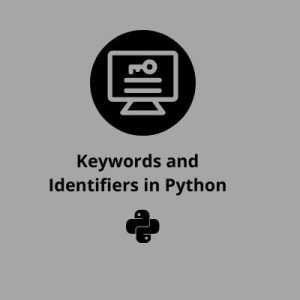
Keywords in Python
Keywords are reserved words in Python that are used to activate specific assignments. We can not utilize a keyword as a variable name, function name, or any different identifier since these keywords each holds a unique meaning. All of the keywords in Python are lowercase.
Python keywords are distant from Python’s built-in functions and types. The built-in functions and kinds are also always obtainable, but they aren’t as restrictive as the keywords in their operation.
Python and its operation are many terms used in the parts below that may be new to you. They’re defined then, and you should be apprehensive of their intention before progressing.
Truthiness refers to the Boolean evaluation of a value. The truthiness of a value indicates whether the value is truthy or falsy.
Truthy means any value that evaluates to true in the Boolean ambient. To decide if a value is truthy, pass it as the argument to bool (). Still, also the value is truthy If it returns True. cases of truthy values are non-empty strings, any figures that aren’t 0, non-empty lists, and numerous further.
Falsy means any value that evaluates to false in the Boolean environment. To determine if a value is falsy, pass it as the argument to bool (). Still, also the valuation is false If it returns False. cases of falsy values are””, 0, (),, and set ().
What’s a Variable in Python?
A variable, as the name indicates is an object whose value is variable over time. A variable is a memory position where a value can be stored. Latterly we can get back the value to use. But forgoing it we need to give a nickname to that memory position so that we can relate to it. That’s an identifier, the nickname.
Identifiers in Python
Python identifier is the name associated with individuality in python. In other words, it can be termed as the choosing assembly used in python programming. The individuals considered for applying the selecting conventions are namely classes, variables, particulars, function, etc. The significant advantage of utilizing these identifier considerations on choosing commodities helps to distinguish or identify one reality from the other. Also, there’s the capability to test the validity of a given special identifier in python programming.
Though these are tough rules for writing identifiers, also some selecting conventions aren’t compulsory but rather valid practices to succeed.
- Class names start with an uppercase letter. All different identifiers start with a lowercase letter.
- Starting an identifier with a single guiding underscore indicates the identifier is confidential.
- Though, that means the identifier is a language-defined special name If the identifier starts and ends with two underscores.
- While c = 10 is valid, writing count = 10 would make further sense and it would be light to figure out what it does indeed when you look at your code after an elongate time.
- Many words can be disassociated using an underscore, for illustration this is a variable.
Conclusion
In this blog, we learned about keywords, variables, identifiers in python and rules for writing identifiers.























![To Increase YouTube Subscribers Must Use These Service Provider [New]](https://businessleed.com/wp-content/uploads/2022/11/To-Increase-YouTube-Subscribers-Must-Use-These-Service-Provider-New-360x180.jpg)














